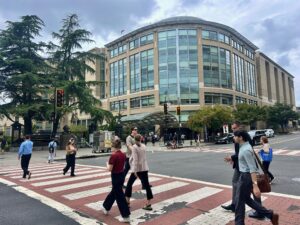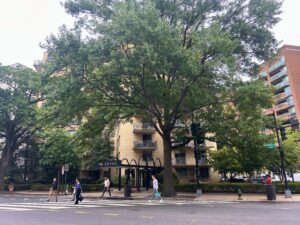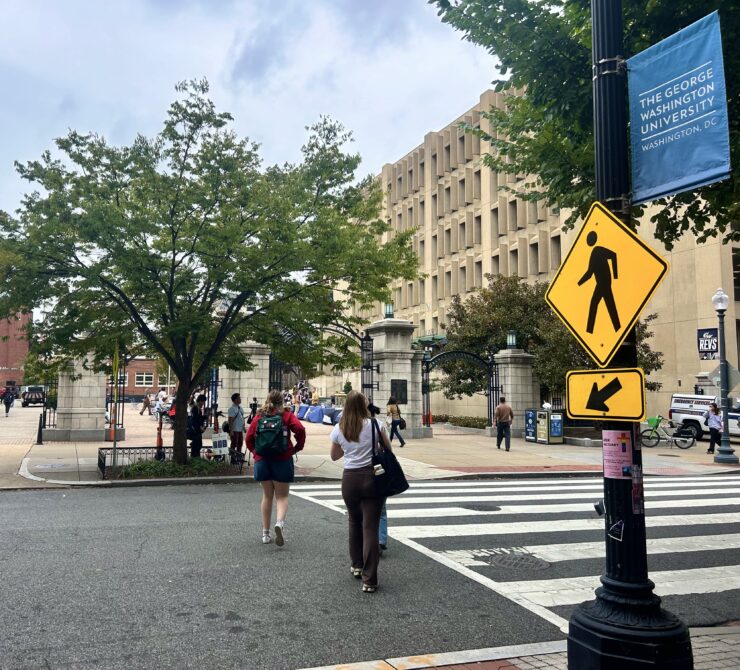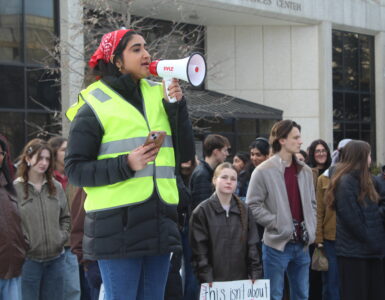Third-year students are no longer required to live on campus. Now, more students and area residents are searching for affordable housing options in Foggy Bottom.
Tatum Oliver, a fourth-year student at George Washington University, is one of many students who sought off-campus housing for the academic year. After spending thousands of dollars every month on a dorm, she had a plan to find an alternative.
However, she said, the already competitive housing market has made it much more difficult to find property in the Foggy Bottom area.
“We definitely toured and talked to umpteen realtors without response,” she said. “I have a spreadsheet where we probably reached out to 100 different properties.”
Housing and Residence Life officials dropped the on-campus housing requirement for the academic year. As of last year, approximately 2,500 students chose to live off-campus per year, with 25 to 35% of the third-year class requesting a housing exemption annually.

“Typically, pricing with on-campus and off-campus housing is comparable if you’re pretty good about it,” Tatum Oliver, a fourth-year student at G.W., said.
Oliver spent last year studying abroad, so she is now living off-campus for the first time. She and a roommate started looking for off-campus housing in May, but were not able to find anything in the Foggy Bottom area.
She said her original budget was between $1,500 and $1,800 per month, compared to about $1,600 per month in an on-campus dorm. Because of the lack of responses from realtors and affordable options in the area, Oliver chose to live in a townhouse in Georgetown instead for about $2,000 per month, not including utility costs.
According to the university’s housing and residence life, students following their second-year were not required to file a housing exemption to live off-campus for the 2024-2025 academic year. Third and fourth-year students who wanted to cancel their housing could before the June 30 deadline.
After the deadline, students would be charged a $1,000 cancellation fee, according to the university’s housing guidelines.
Sophia Johnson, also a fourth-year student at G.W., wanted to live off-campus because of the expenses of on-campus housing and dining plans. In her first year living in an on-campus dorm, Johnson paid about $7,000 per semester. She described her experience finding off-campus housing as a “huge pain.”
“I’m not from D.C., and I go back home to the West Coast for summers,” she said. “I did all of my apartment searching online and couldn’t do any in-person touring. I think the difficulty was finding a convenient, affordable option.”
Johnson said many of the bigger student apartment buildings charged more than her budget allowed. After searching, she found a studio apartment in the Foggy Bottom area for $1,650 per month plus electric and WiFi expenses.

“It’s very hard to find property,” Samer Kuraishi, real estate agent and president of The ONE Street Company, said. “We’re in a low inventory market, and demand is super high.”
Kuraishi launched the real estate company in 2017, focusing on residential and commercial real estate and developments. He said because of increasing homeownership prices, there is a need for more housing opportunities in the area.
“There is going to be competition across the board that could put a lot of pressure on student housing,” he said.
Kuraishi said the company consistently works with G.W. students to find housing rentals in the area. The application process for rentals is the same for students, but he said they typically include a co-signer because of a student’s lack of income.
The company is also developing a 48-unit apartment building at 2121 Ward Place NW. Kuraishi said the building will be marketed toward G.W. students, as well as other young professionals and families in the area.
As for other future housing options, Kuraishi said there will constantly be a need for more options for both residents and students in the area.
“D.C. ‘s like the Vatican,” Kuraishi said. “The prices are going to keep going through the roof.”















Add comment